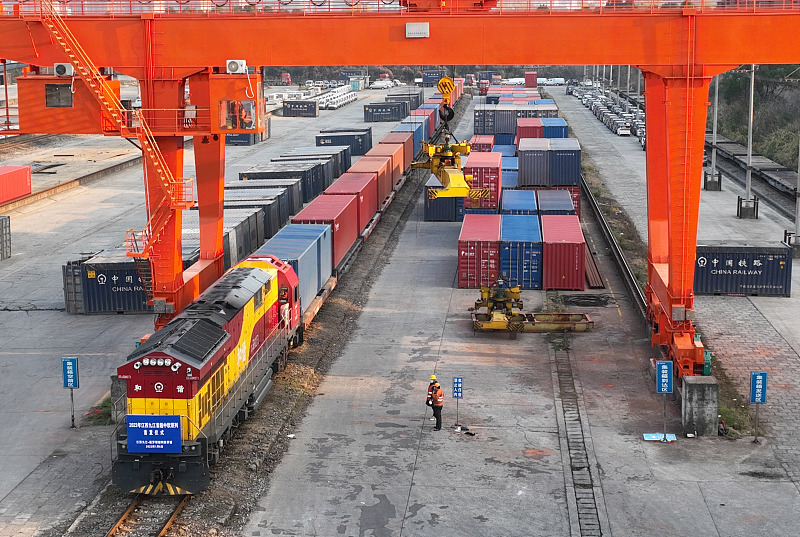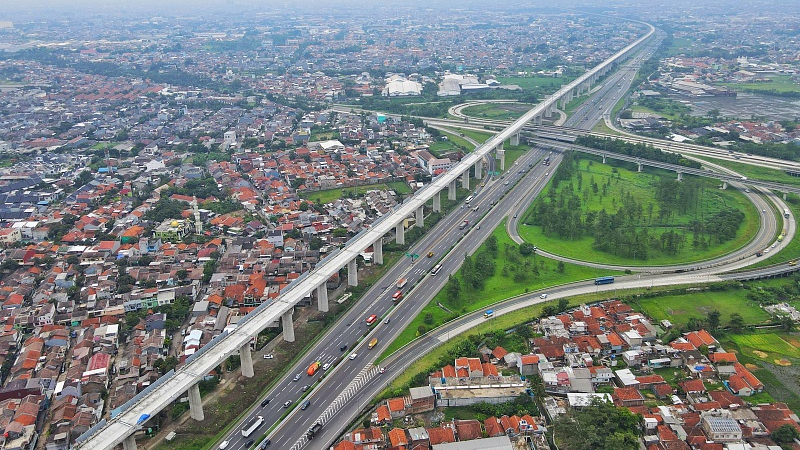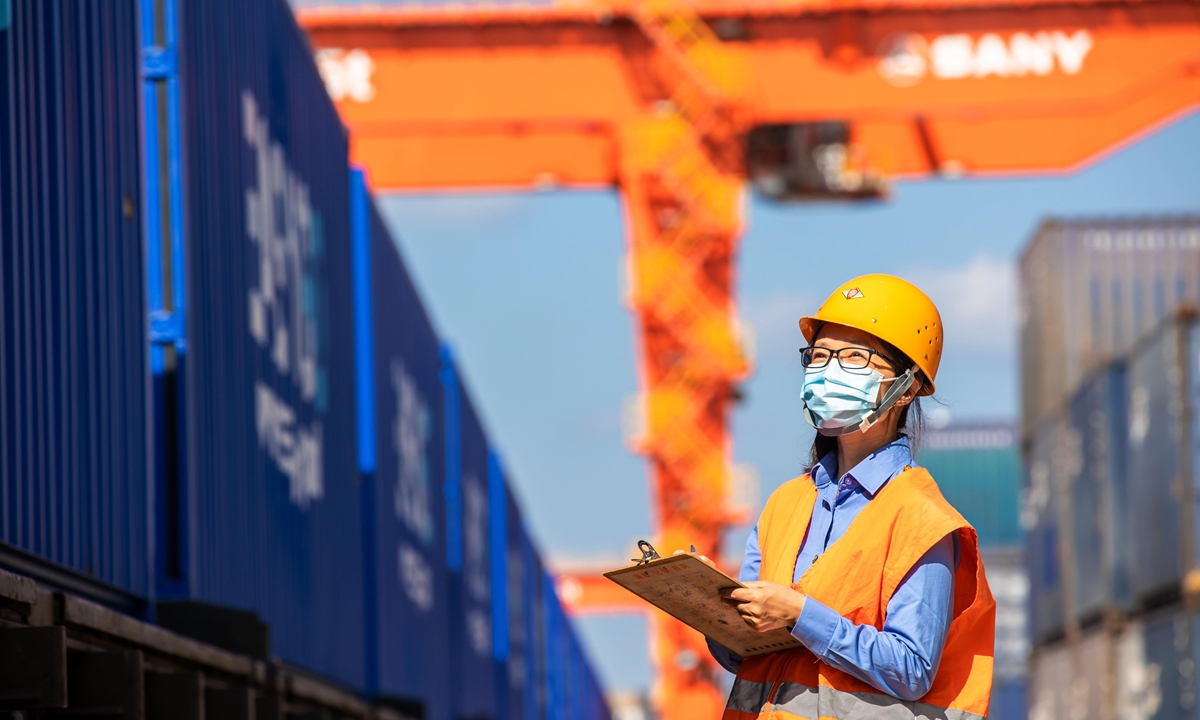for thailand it is a no-brainer. I believe they have already begun to build a sector of the HSR linking China. Since Thailand's HSR has to link up with China through Laos, they are left with only the choice of asking the Chinese to build it for them, not that it is anything bad since China is now the undisputed leader in the HSR sector. Now that the world has rid itself of covid restrictions it is certainly in Thailand's favor to get this done as quickly as possible to reap the rewards.I heard the success of the China-Laos Railway has been a huge motivating factor for Thailand and Myanmar to get their respective projects completed. I think I remember seeing an estimate that the Laos railway could increase said country's GDP growth by 1.6% in 2023 (previously projected to grow 3%, an over 50% increase).
It's a perfect illustration of the BRI strategy- you can either hop on the development train or see all of your regional rivals leapfrog you by light years. Hopefully it'll convince the Philippines as well.
You are using an out of date browser. It may not display this or other websites correctly.
You should upgrade or use an alternative browser.
You should upgrade or use an alternative browser.
BRICS & New World Order Thread
- Thread starter Strangelove
- Start date
Saudi Arabia is a weather vane for the rest of the world, the fall of the West couldn't be more obvious right now. We're going to see all kinds of tiny, fence-sitter countries crawling out of the woodwork to beg for a ticket into the China club this year.
Something to look forward to in a few months:
Pepe Escobar, one of my favorite geopolitical analyst.Saudi Arabia is a weather vane for the rest of the world, the fall of the West couldn't be more obvious right now. We're going to see all kinds of tiny, fence-sitter countries crawling out of the woodwork to beg for a ticket into the China club this year.
Something to look forward to in a few months:
I think one good point brought up in the video for entwining Sino-Russian relations in the long-term is the sinicization of the Russian elite's youth. Encourage student exchange programs, start a version of for the wealthy, open more private international schools, etc. The less they identify with europe and more with eurasia, the better.
China has signed BRI cooperation documents with all Central Asian states: MOFA

The first China-Europe freight train in 2023 departs from the South Railway Station in Jiujiang in east China's Jiangxi Province, January 5, 2023. /CFP
China has signed cooperation documents on the Belt and Road Initiative (BRI) with all Central Asian countries after China signed a memorandum of understanding with Turkmenistan days ago, and China's BRI cooperation circle is still expanding, according to Ministry of Foreign Affairs spokesperson Wang Wenbin.
During Tuesday's news briefing, Wang said signing the memorandum of understanding is a significant achievement for both countries, which will further expand the economic and trade cooperation between the two countries and upgrade the BRI cooperation between China and the five Central Asian countries to a new stage.
Over the past year, the BRI has made steady progress, injecting new impetus into world economic recovery: A total of 16,000 China-Europe freight trains were operated and carried 1.6 million twenty-foot equivalent units (TEUs) of goods, which are up 9 percent and 10 percent, respectively. The New International Land-Sea Trade Corridor, an important trade and logistics passage, transported 750,000 TEUs of goods, up 18.5 percent year on year, according to Wang.

The Jakarta-Bandung High-speed Railway spans the most densely populated village in Bandung City, Indonesia, October 10, 2022. /CFP
Over 9 million trips have also been made on the China-Laos railway. More than 1 million vehicles have hit the road since Cambodia's first highway, the Golden Port Expressway, opened to the public and the Jakarta-Bandung High-speed Railway, the first of its kind in Southeast Asia, which has also been put into trial operation, Wang said.
He added that five countries signed new BRI cooperation documents with China last year, and China has just renewed the BRI memorandum of understanding with the Philippines.
"All these show that the BRI meets the needs of world development and the expectations of the international community," Wang said. "It will remain resilient and dynamic."
Wang noted 2023 marks the 10th anniversary of the BRI and China will continue to follow the principle of extensive consultation, joint contribution and shared benefits, work with all parties for common development, and make the BRI a bond that benefits the whole world.
As BRI enters 10th year of development, China-Europe freight train set to see ‘explosive growth’ in 2023
Key BRI flagship connectivity project stabilizes supply chain, builds new global trade landscape
By Tao Mingyang in Erenhot, Li and Yin Yeping in Beijing Published: Jan 12, 2023 08:44 PM

An operator sees off a China-Europe freight train with 50 containers in Ganzhou, East China's Jiangxi Province on October 1, 2022. File photo: VCG
Editor's Note:
This year marks the 10th anniversary of the China-proposed Belt and Road Initiative (BRI), a global cooperation platform that demonstrates China's vision and provides solutions to the reform of the global governance system and multifaceted challenges. Reflecting on the development of the BRI over the last decade, there has been no shortage of evidence demonstrating that it is a big success, a momentum that relentless Western crackdowns and smears were unable to reverse.
Standing on this monumental juncture, the Global Times is publishing a series of articles to help readers understand the fruitful journey of the BRI over the last decade from multiple perspectives, and how the initiative will positively commence over the year. This is the first installment in the series, examining the impressive development of the China-Europe freight train.
With a long whistle, a China-Europe freight train slowly moved across the border port in Erenhot, North China's Inner Mongolia Autonomous Region in Tuesday's grainy morning. The train, marking the first of a batch of China-Europe freight trains that started off in 2023 - the 10th anniversary of the China-proposed Belt and Road Initiative (BRI) - was en route to Mongolia with tons of auto parts and machinery products on board.
The train was also among one of the first to see streamlined custom clearance and shortened cross-border transportation time, after China downgraded its COVID-19 response and reopened its borders on Sunday.
The train's 30-something driver smiled and waved when approaching the border port, the biggest port crossing for trade and personnel exchanges between the two countries. For him, the New Year was ushered in, vitality was back, and expectations for a more financially prosperous future were high as his volume of work is set to increase, along with an upbeat note on bilateral trade between China and Mongolia.
Five kilometers away at a container yard in Erenhot, dozens of trucks had already lined up to offload goods from trains and transport them to other Chinese cities. On the other side of the yard, container cranes were loading pieces of bulk cargo onto another China-Europe freight train, preparing for its departure later in the day.
Across China, multiple China-Europe freight trains from different Chinese cities have made their maiden journey in 2023. On January 1, a China-Europe freight train left a station in Southwest China's Chongqing Municipality and is scheduled to arrive in Duisburg, Germany in about 15 days.
"January is usually the off season for China-Europe freight trains, but this year we're seeing a change. There are more than 20 trains transporting our cargo in January, mostly from Russia. The delivery period has also shrunk to about one week, from 15-20 days in 2022," Meng Xiangyu, a manager at the Erenhot-based Hengtong International Freight Forwarder, told the Global Times on Wednesday.
Back in 2016, China inaugurated the very first China-Europe freight train - under a unified express logo - destined for Poland. And after seven years of operation, the railway has recorded booming development, proven itself a pillar of Asia-Europe trade and a flagship connectivity project under BRI, especially in the last three years amid the fog of the epidemic, rising geopolitical tensions, and supply chain disruptions.
As the BRI celebrates its 10th anniversary this year, the China-Europe freight train is also set to usher in a critical stage of "explosive growth," and China's reopening, the accelerated implementation of BRI projects, and deepened trade ties with Asian and European economies will all fuel the momentum, according to officials and global freight companies.
High-quality development
Zhang Tianbang, the general manager of Zhengzhou Huanhang International Freight Co., told the Global Times on Wednesday that his company has seen gradual advancements in business with regard to the freight train since January. Zhang himself is now on a trip abroad to countries along the BRI including Russia, Belarus, Kazakhstan, and Uzbekistan, visiting clients face-to-face and discussing potential deals.
According to Zhang, he has discussed cooperation on a large-scale stadium project with Belarusian clients. The project requires the importation of key equipment from China, such as engineering vehicles, crane machinery, and steel structures. Such supplies are among one of the leading form of cargo transported by China-Europe freight trains.
Tommy Tan, president of the Shanghai EPU Supply Chain Management Co., an agent for China-EU freight trains, took note of accelerated border trade and personal exchange after the reopening of borders, which he said injected new vitality to foreign trade.
"Many peers in the foreign trade industry also embarked on overseas trips to visit clients, some of which are organized by local commerce authorities. Betting on the trend, the foreign trade market is projected to see fast recovery, increasing the demand for using China-Europe freight trains," Zhang said.
A customs official in Erenhot surnamed Wang told the Global Times on Tuesday that road traffic in the border port has gradually returned to pre-epidemic levels in recent days and freight trains can handle increased demand. Wang said the freight volume via the port has expanded 10 percent last year.
In 2022, there were 16,000 China-Europe freight trains launched, sending 1.6 million twenty-foot equivalent units (TEUs), up 9 percent and 10 percent year-on-year, respectively, data from the China State Railway Group Co. showed. The robust data, bucking the backdrop of the lackluster global economy, speaks volume for the train's amassing and irreplaceable role in stabilizing the global supply chain.
In 2022, China also made solid efforts to increase the transport capacity of the trains. In November, the first full-time schedule China-Europe freight train was dispatched and arrived to Duisburg, Germany after an 11-day journey.
A full-time schedule means the arrival and departure time as well as the running route are fixed in each section, unlike the previous model under which local railway departments set separate running times.
"This is the core competitiveness of China-Europe freight trains. I expect more full-time schedule trains to be launched this year, and the travel time will be further reduced to 10 days, setting in motion a new stage of high-quality development," Tan told Global Times on Wednesday, while noting that the company will mull over more tailored-made delivery plans for specific products this year.
More than a stabilizer
Over the last three years, China-Europe freight trains have earned the reputation of "a passage of life" when sea and air transportation were crippled by the pandemic. More than 109,000 tons of anti-pandemic products have been sent to Europe through the trains to date, along with auto parts, electronic products, and raw materials, effectively guaranteeing the stability of international industrial and supply chains.
"The train has created a new passage between China, Central Asia, East Asia, Southeast Asia, and the European continent. It is also building a new landscape in global trade that will lead to win-win cooperation with countries and regions along the BRI," Liang Haiming, dean of the Belt and Road Institute at Hainan University, told the Global Times on Thursday.
Many trading agencies, for instance, would opt for the train if the cargo was sent from Japan, South Korea, and Southeast Asia and heading to Mongolia, and central Asia, according to industry insiders.
Observers also noted that the train is crucial to the economy of transit countries such as Mongolia and Belarus, as it boosts those countries' transportation income and foreign exchange inflows.
"Looking into 2023, the China-Europe freight trains' further growth will open up more markets and deepen China's trade ties with BRI countries. More importantly, the train, a vivid display of China's commitment to globalization and opening-up, will push against the decoupling rhetoric of certain Western counties, connect the world better, and encourage more countries to actively engage in the talks of free trade and new rules of engagement," Liang noted.
Actually not as far fetched as it might seem. Lula has gained a lot of political capital with zero western resistance. Couple that with Brazil delaying its BRICS Presidency and a conspiracy is likely on play hereBrazil’s Explanation For Delaying Its BRICS Presidency Is Extremely Suspicious
